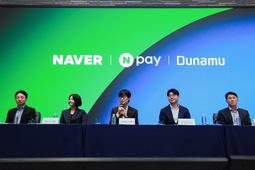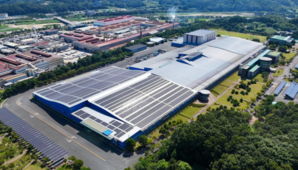
[News Space=Reporter seungwon lee] Recently, the internal loan system operated by domestic large corporations and public institutions is rapidly emerging as a 'way to circumvent real estate regulations.'
As regulations on household loans at commercial banks tighten, leading companies like Samsung, Hyundai Motor, Naver, Kakao, SK Hynix, and Dunamu are significantly raising and lowering in-house loan limits and interest rates as employee benefits. Dunamu, in particular, recently raised its in-house loan limit from 300 million won to 500 million won and operated it at a near-zero interest rate, despite measures to stabilize housing prices. This has sparked controversy over its "unprecedented welfare."
In-house loans without DSR or LTV have surged 63% in the past five years.
The fact that in-house loans are treated as "employee welfare funds" is a significant draw for those facing financial constraints. When companies directly issue loans, the limit is freely calculated without any financial regulations, such as the debt service ratio (DSR) or loan-to-value (LTV) ratio, and credit scores are not affected.
In fact, annual lending increased by 63% from around 2 trillion won in 2020 to 3.0392 trillion won in 2023, and the balance of internal loans at the top seven institutions, including public institutions, also increased by more than 50 billion won over the past five years.
The limits and interest rates for in-house loans offered by companies with excellent in-house welfare programs are as follows.
Dunamu: Up to 500 million won, interest-free
SK Hynix: Up to KRW 200 million, 1.5%
Naver: Up to KRW 200 million, 1.5% interest (up to 10 years)
Kakao: Up to 150 million won, interest rate exceeding 2%
Hyundai Motor Company: Up to KRW 100 million, 2.0%
Public institutions such as KAMCO: KRW 100 million to KRW 160 million, 3.3% or base rate + 0.73%, etc.
Considering that the average interest rate on commercial bank mortgage loans is 4-4.2% (as of October 2025), the radical nature of in-house loans becomes clear.
Comparison of Overseas Welfare and Institutional Significance
Global companies overseas also offer low-interest in-house loans or welfare fund loans as part of their employee benefits, but fundamental differences exist in terms of limits and eligibility. Global IT companies sometimes offer optional benefits worth millions of won annually or interest-free loans to employees with multiple years of service. Korea is even more innovative in that it offers cash-based, long-term loans.
Regulatory Discrimination and Policy Controversy
On the other hand, as in-house loans operate as a safe haven from various financial regulations, such as the DSR, there has been considerable criticism of reverse discrimination, with lending privileges concentrated only on high-income earners at large corporations and public institutions. Public institutions have also come under fire for issuing loans exceeding 100 million won (160 million won for KAMCO) at low interest rates (3.3%), despite government guidelines for 2021.
Some argue that in-house lending effectively circumvents real estate regulations, and voice concerns about the widening imbalance in financial access between ordinary citizens and the general public.
An executive working at a mid-sized company said, "It is difficult for ordinary office workers and ordinary citizens to obtain financial loans due to the government's real estate loan regulations, and the high interest rates are a huge burden." He added, "However, it is unfair to avoid government regulations just because you work for a large company."
From welfare to talent acquisition to ESG... the multi-layered evolution of in-house funds.
Recently, domestic companies are seeking to achieve multifaceted benefits through the operation of welfare funds, including talent recruitment, long-term employment, organizational stability, tax strategies, and increased corporate value.
Fund support amounts range from hundreds of billions to trillions of won for large corporations, and the government also provides up to 50% of the costs, or up to 200 million won annually, to companies operating welfare funds. This support is closely linked to policies such as selective welfare, business succession, and socially responsible (ESG) management.
























































